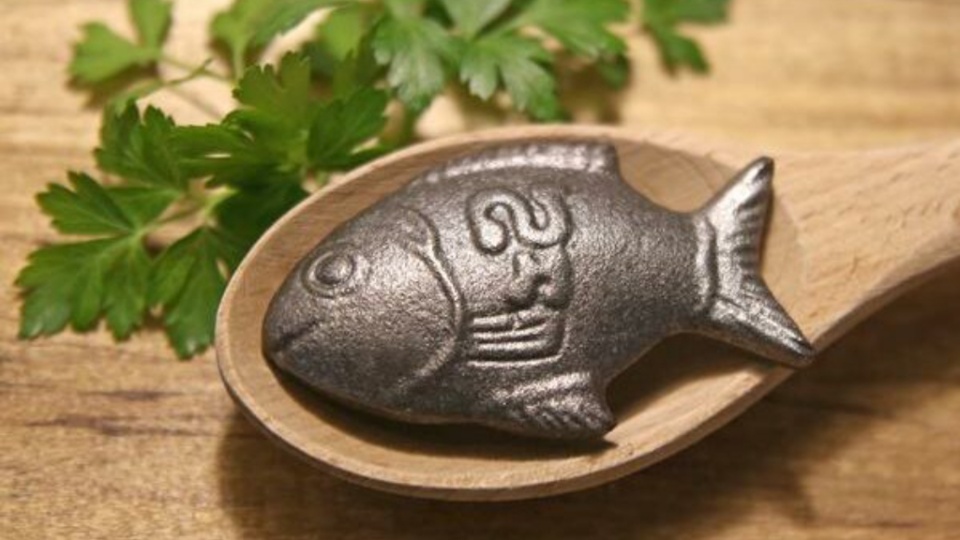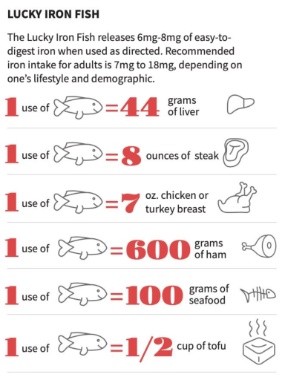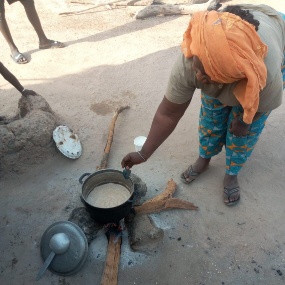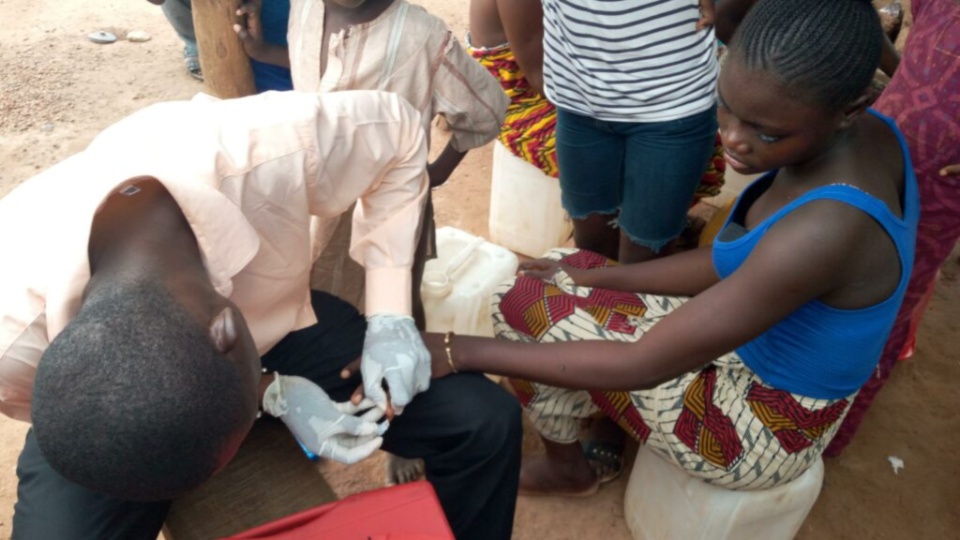
Iron-Fish
Latter-day Saint Charities purchased thousands of iron fish supplements that are being used daily by rural families in Senegal and Benin to fight high rates of iron deficiency anemia. Photo courtesy of Latter-day Saint Charities, courtesy of Church News.All rights reserved.This story appears here courtesy of TheChurchNews.com. It is not for use by other media.
By Jason Swensen, Church News
A wise, oft-repeated proverb teaches that if you give a person a fish, he or she will eat for a day — but if you teach them to fish, they will eat for a lifetime.
Apparently, there is also wisdom in teaching someone to cook with a fish — specifically, an iron fish. An ongoing effort between the Church and its humanitarian partners is helping families in many parts of western Africa battle anemia by teaching them to cook with a “lucky” iron fish.
First, an (iron) fish tale that needs no exaggeration.
Lucky Iron Fish is a patented, reusable cooking tool that a family can add to a boiling pot of soup, broth or rice. Once the hot, liquid-based meal is ready to eat, the tiny iron fish is removed, cleaned and set aside for the next day’s meal prep.
While the iron fish may be gone from the meal, the health benefits remain. When used consistently and as directed, the tool releases 6–8 milligrams of iron — enough of the essential mineral to help remedy and prevent iron deficiency in a person.

Iron-fish
Iron fish information. Graphic courtesy of Church News.All rights reserved.Iron deficiency anemia is a dangerous condition often caused by malnutrition, particularly in impoverished areas of the world lacking dietary diversity. It can be a form of chronic “hidden” hunger, typically found when a person is not eating recommended amounts of necessary nutrients.
“Unfortunately, the effects of that hidden hunger can be just as severe as acute hunger,” said Julie Ramos, a manager for the Latter-day Saint Charities Clean Water and Food Security program. “It’s long-term and can harm the body over time.”
Iron helps blood move oxygen from the lungs to the rest of the body. Someone without adequate iron often feels fatigued or dizzy, and they are vulnerable to illness. An anemic person simply cannot function optimally.
Fighting all forms of hunger is one of the key initiatives of Latter-day Saint Charities.
Often, the Church’s most effective way to bring relief to people battling some form of malnourishment in various parts of the world is to partner with local humanitarian organizations that “have the expertise and the local resources to address [all different] types of hunger,” Ramos said.
Latter-day Saint Charities’ iron fish program is designed to help rural communities in two West African nations — Benin and Senegal — successfully wage a daily battle against iron deficiency anemia.
In Benin, Latter-day Saint Charities partners with the relief organization CARE. In Senegal, with Catholic Relief Services.
One way to treat anemia is to increase iron intake as a micronutrient supplement, Ramos explained. The Church and its partners do that by providing families with an iron fish tool.
Manufactured by a for-profit Canadian company, the patented Lucky Iron Fish is a fish-shaped piece of iron about two inches long.
Many nongovernmental humanitarian organizations, including Latter-day Saint Charities, are purchasing and distributing the fish tool because it is a cost-effective, proven way to introduce iron into someone’s diet. It emits iron to the food as it is being cooked. And it can be used daily for several years.
Cooking with an iron fish “is a way to introduce a lot of iron in a short amount of time,” Ramos said. “A family can use it over and over again — and anyone eating the food that the iron fish was cooked with is consuming extra amounts of iron.”
Using Trusted Local Women’s Groups

Iron-fish
A woman in Senegal adds an iron fish supplement to a pot of porridge. The iron tool — which is subsidized by Latter-day Saint Charities — is helping rural villagers in West Africa battle anemia. Photo courtesy of Latter-day Saint Charities, courtesy of Church News.All rights reserved.The project’s biggest challenge is behavioral — convincing would-be users that the iron fish supplements are safe and actually work when used consistently.
“It is kind of weird to put this little chunk of iron into their food,” Ramos said with a laugh.
The most effective way to persuade families in Benin and Senegal to properly and consistently cook with the fish tool is through trusted, existing, local women’s groups that function similar to Relief Society units.
The Church’s in-country partners are staffed locally and include people from the villages they serve, providing an essential level of trust. The local women’s groups provide ongoing support such as hosting cooking classes and “finding a few key champions that will really buy into the program and then train and teach others in the village.”
Latter-day Saint Charities, meanwhile, helps subsidize the cost of the iron fish, which are typically donated to families. To date, thousands of households in both Benin and Senegal have been the beneficiaries of an iron-supplementing fish because of the ongoing Church-assisted program.
Beneficiaries of Latter-day Saint Charities’ iron fish program are grateful for opportunities for improved health in their families and communities. A 39-year-old Senegal Dianacouta villager and married father of four named Salam Ba said the supplement is both a needed and a blessed gift.
“We are vulnerable families,” Salam Ba wrote. “Our women suffer from anemia, and our children are malnourished because of the poor quality of our meals.”
Fish: A Christian Symbol of Physical and Spiritual Wellness

Iron-fish
A technician in Senegal tests a young woman’s blood to screen for iron deficiency anemia. The Church and its humanitarian partners sponsor an ongoing nutrition program to battle anemia in Senegal and Benin. Photo courtesy of Latter-day Saint Charities, courtesy of Church News.All rights reserved.Ramos notes that the iron fish project is not a standalone solution to iron deficiency anemia in impoverished communities. But when coupled with other nutritional interventions such as helping families grow and eat more nutritious food, the hoped-for health benefits of the fish tool can be realized.
Latter-day Saint Charities participated in a recent study of the iron fish supplement in Senegal to evaluate its impact in targeted communities and collect health data. The results have been positive, Ramos said.
A tool shaped like a happy fish seems an apt design for the iron supplement. Fish, of course, are plentiful and nutritious. And in some parts of the world, fish are good luck symbols. It is also an ancient and contemporary Christian symbol.
And in similitude with the familiar “give someone a fish” parable, Latter-day Saint Charities’ iron fish project is helping families enjoy sustainable health and spiritual well-being.
“We are helping people understand the importance of nutrition,” Ramos said. “And that beautifully aligns with the Word of Wisdom and taking care of our health and our bodies.”
Copyright 2021 Deseret News Publishing Company